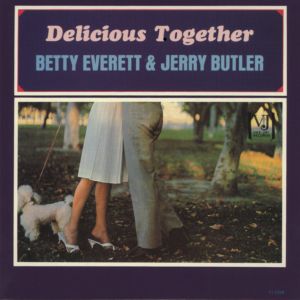
- Format: MP3

Japan 24-Bit Remaster
Betty Everett sang gospel growing up in Greenwood, MS, before relocating to Chicago and moving into secular music. She began recording for Cobra in 1958, then joined Vee-Jay in the early '60s and started to land hit records. Her original version of "You're No Good," though sung with fire and verve, didn't make much impact until it was turned into a number one pop hit by Linda Ronstadt in 1975. Her next single, "The Shoop Shoop Song (It's in His Kiss)," was her first major release, peaking at number six pop in 1964. Her next success was the duet "Let it Be Me" with Jerry Butler, a soul version of the Everly Brothers tune that reached number five R&B that same year. Everett's finest song as a solo act was 1969's "There'll Come a Time," which reached number two on the R&B charts and also cracked the pop Top 30 at number 26. Everett was now on Uni, where she remained until 1970. She continued recording for Fantasy until 1974 and made one other record for United Artists in 1978. A comeback performance for the 2000 PBS special Doo Wop 51 was her last public appearance; she died at her Wisconsin home in August 2001.
Jerry Butler's career spans four decades; he recorded more than 50 albums and his voice is one of the most distinguished voices in all of music. As soulful as ever, yet smooth as ice, his nickname "the Ice Man" epitomizes his demeanor — and sound. In spite of his status as a true music icon, he remains humble. Butler moved from Sunflower, MS, to Chicago, IL, at the age of three during the mass migration of blacks from the South to the North. (He grew up in an area which is now known as the Cabrini-Green Housing Projects.)
Butler acquired his initial music lessons as a young boy while a member of the church choir in Chicago. Curtis Mayfield, who was three years younger, was also a member of the same choir. The two befriended each other and began a collaboration that would have an everlasting impact on music. The twosome joined up with brothers Arthur and Richard Brooks and Sam Gooden to form the R&B group the Roosters. In fact, the Brooks brothers, Gooden, and a female had migrated to Chicago from Tennessee, and were called the Roosters & a Chick. But when Butler and Mayfield joined them, the group became simply the Roosters. In 1957, the quintet's name was changed to Jerry Butler & the Impressions. Butler scored his first hit with the Impressions in 1958 with the timeless ballad "For Your Precious Love." (He'd written the lyrics to the song when he was just 16.)
That same year Butler and the Impressions cordially split, and Butler began his solo career. He released his first single, "Lost," on the Abner label. It peaked at number 17 on the Billboard R&B charts. Jumping over to Vee-Jay in late 1960 where his career blossomed, Butler had his first hit as a solo artist with "He Will Break Your Heart." The single popped to the top of the charts at number one and stayed there for seven consecutive weeks. In 1961, Butler bounced back with two Top Ten singles: "Find Another Girl" and "I'm a Telling You." In 1967, he signed with Mercury and teamed up with the production duo of Kenny Gamble and Leon Huff. His work with these two master producers and songwriters resulted in some classic recordings, including the outstanding album The Ice Man Cometh. The album featured one superb track after another, including two number-one singles ("Hey, Western Union Man," "Only the Strong Survive") and two Top Ten singles ("Never Give You Up," "Are You Happy"). Always known for being a crooner, "Hey, Western Union Man" revealed to many that Butler was more than capable of singing up-tempo songs.
In 1971, Gamble and Huff formed their own label and subsequently Butler formed a creative workshop to help provide material for his forthcoming albums. Material that did not make his albums, he marketed to other artists. In the spring of 1971, Butler hit the Top Ten with the number-eight single "If It's Real What I Feel," which was written by Chuck Jackson (the younger brother of Rev. Jesse Jackson). Butler continued his hit-making tradition with "Ain't Understanding Mellow," a classic soul-ballad duet with Brenda Lee Eager that peaked at number three on the Billboard R&B charts. Butler scored a number-six single with Eager with a remake of the Carpenters' "(They Long to Be) Close to You" and a solo hit with a remake of the O'Jays' "One Night Affair," which was also his last song to crack the Top Ten.
Never one to categorize singers because he believes that a singer is a singer — not based on genre, but on a person's mere ability to sing — Butler himself covered several styles of music during his lengthy music career. He had many highs in his career; ranging from sharing the spotlight with such greats as Aretha Franklin to being the chairman of the board for the Rhythm and Blues Foundation (a non-profit organization). Butler also became a force in another field: politics. In the mid-'80s, he was a significant campaign supporter of Chicago's first black mayor Harold Washington. A short time later, Butler himself became the Cook County (IL) Commissioner and by the late '90s he was a Chicago City Alderman. When the great Jerry Butler is not lobbying for his constituents, he can be found on-stage giving one of his spine-chilling performances with Ice Man-cool delivery.